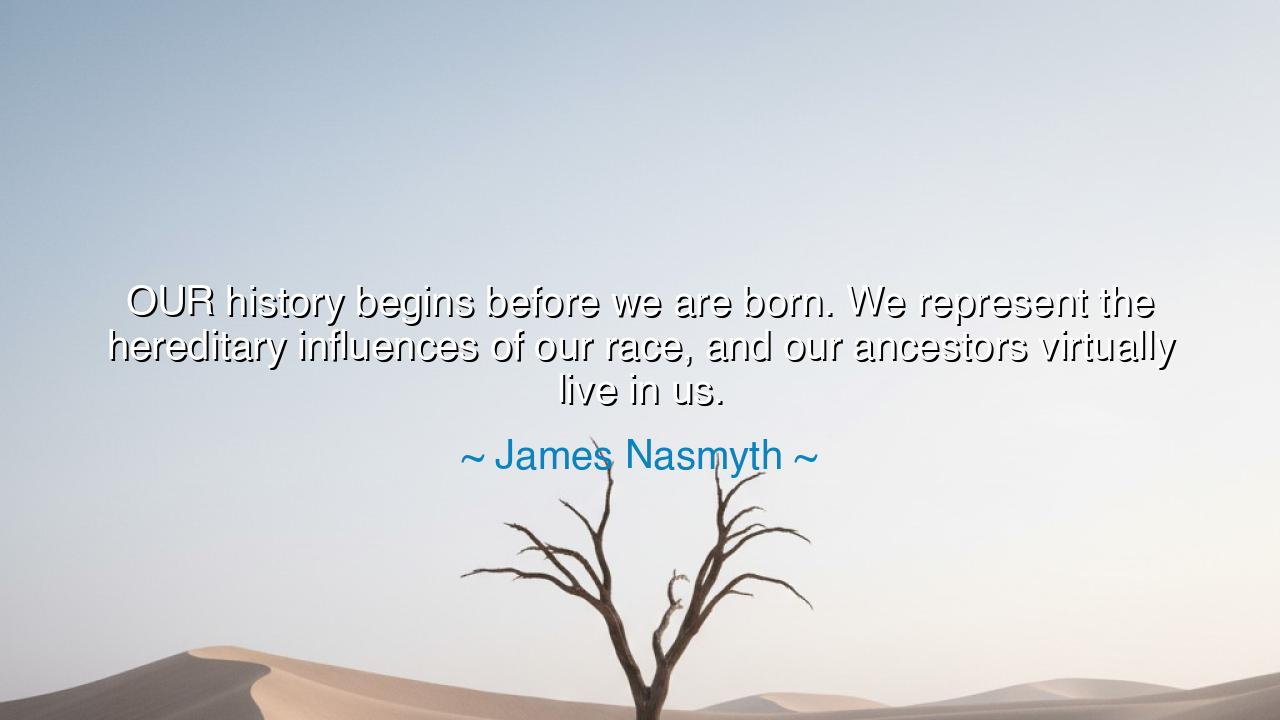
OUR history begins before we are born. We represent the
OUR history begins before we are born. We represent the hereditary influences of our race, and our ancestors virtually live in us.






“Our history begins before we are born. We represent the hereditary influences of our race, and our ancestors virtually live in us.” — Thus spoke James Nasmyth, the Scottish engineer whose hands built machines of iron, yet whose mind grasped the subtler engines of destiny. In these words lies a truth vast as time itself: that we are not merely children of the present moment, but heirs of ages. The story of our lives does not begin with our first breath — it began long before, in the thoughts, struggles, and triumphs of those who came before us. We are the continuation of their song, the living embodiment of ancestral memory.
To say that our history begins before we are born is to recognize that no soul is an island. The blood that flows within us carries not only life but legacy — the echoes of countless generations who shaped our being. Their courage and their fear, their wisdom and their folly, their hopes and their scars — all these are written in our flesh, in our thoughts, and in the unseen architecture of our spirits. We are not accidents of existence, but chapters in an unending story. Each of us is a vessel of inherited strength, a bridge between what was and what may yet be.
When Nasmyth speaks of hereditary influences, he does not mean only the inheritance of body or mind, but the deep and mysterious inheritance of spirit — that invisible thread connecting us to the vast tapestry of our people. The ancients knew this truth well. The Greeks spoke of the daimon, the spirit of lineage that guided the fate of a family. The Hebrews told of Abraham’s seed, a covenant passed through generations. In every culture, from the clans of the Highlands to the tribes of Africa, there beats the same belief: that the ancestors do not vanish, but live through their descendants, whispering through blood and memory.
Consider the story of Nelson Mandela, born into a line of Thembu chiefs. His dignity, his endurance, his deep sense of justice — these were not born in a vacuum. They were the fruit of generations who had carried wisdom and resilience through the long journey of oppression. When Mandela stood before the world as a symbol of freedom, he was not one man alone; he was the voice of countless ancestors who had dreamed of that moment. His courage was their courage renewed. Thus, as Nasmyth wrote, “our ancestors virtually live in us.” They speak through our choices, they breathe through our deeds, and their unfinished dreams wait for our hands to complete them.
But this inheritance is not only a gift — it is a responsibility. To carry the past within us is to bear its weight with reverence. For we are shaped by both the light and the shadow of history. The virtues of our forebears inspire us; their mistakes warn us. The blood of conquerors and poets, of mothers and laborers, of dreamers and builders — all flows within us. It is not enough to honor them in name alone; we must continue their work, purifying what was flawed, redeeming what was lost, and carrying forward what was noble. To forget our lineage is to break the chain of meaning that binds humanity together.
Nasmyth’s words also reveal a truth for our time — that identity is not invention but inheritance. In a world obsessed with novelty, we must remember that we stand on foundations laid by those who came before. Every discovery, every poem, every act of justice has roots that reach into the soil of the past. The machines Nasmyth himself built were born from centuries of craftsmanship, curiosity, and labor. His genius did not appear from nowhere; it was the flowering of generations who worked and dreamed before him. So too, in each of us, there lies the seed of inherited wisdom waiting to be awakened.
Let this be your lesson: walk through life not as one who begins, but as one who continues. When you act, remember that you carry the silent hopes of your ancestors; when you speak, remember that their voices still echo within your own. Seek to understand the history that lives in your blood — the struggles that shaped your family, the traditions that molded your people, the values that built your world. To know yourself truly is to know those who came before you.
And finally, live so that you, too, may become a worthy ancestor. The story does not end with you; it only passes through you. Leave behind not just wealth or name, but virtue, courage, and wisdom, that your descendants may say, “Our history began before us — and in us, it continues.” For as James Nasmyth teaches, the past is not dead, nor is it gone; it walks beside us, it breathes within us, and through our lives, it lives anew.






AAdministratorAdministrator
Welcome, honored guests. Please leave a comment, we will respond soon